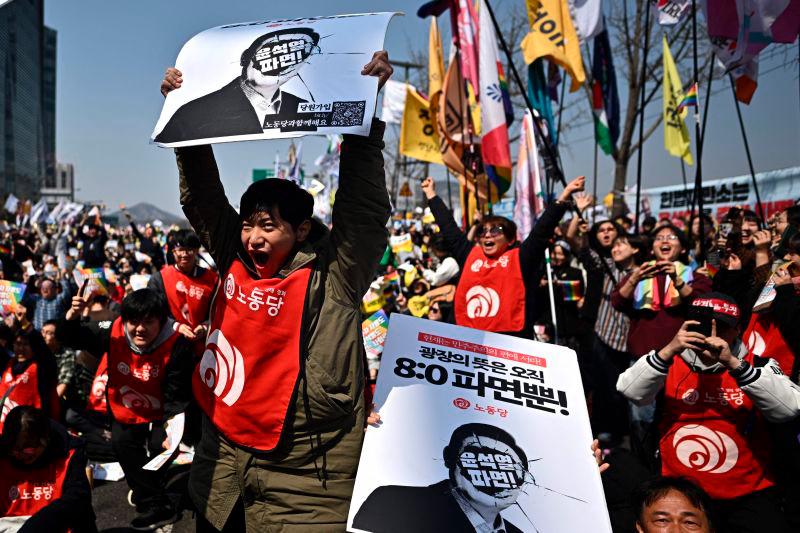SEOUL: South Korea's top court on Friday unanimously ruled to remove impeached president Yoon Suk Yeol from office over his disastrous martial law declaration, triggering fresh elections after months of political turmoil.
Yoon, 64, was suspended by lawmakers over his December 3 attempt to subvert civilian rule, which saw armed soldiers deployed to parliament. He was also arrested on insurrection charges as part of a separate criminal case.
Millions of Koreans watched the Constitutional Court hand down its verdict live on television, with the country's main messaging app KakaoTalk telling AFP that some users were experiencing delays due to a sudden surge in traffic.
“Given the serious negative impact and far-reaching consequences of the respondent’s constitutional violations... (We) dismiss respondent President Yoon Suk Yeol,“ acting court President Moon Hyung-bae said while delivering the ruling.
Yoon's removal, which is effective immediately, triggers fresh presidential elections, which must be held within 60 days. Authorities will announce a date in the coming days.
Outside the court, AFP reporters heard Yoon supporters shouting threats that they wanted to kill the judges, who decided unanimously to uphold Yoon's impeachment, and have been given additional security protection by police.
Yoon’s actions “violate the core principles of the rule of law and democratic governance”, the judges said in their ruling.
Yoon sending armed soldiers to parliament in a bid to prevent lawmakers from voting down his decree “violated the political neutrality of the armed forces”.
He deployed troops for “political purposes”, the judges added.
“In the end, the respondent’s unconstitutional and illegal acts are a betrayal of the people’s trust and constitute a serious violation of the law that cannot be tolerated,“ they ruled.
Opposition party lawmakers clapped their hands as the verdict was announced, calling it “historic”, while lawmakers from Yoon’s party filed out of the courtroom.
Yoon apologised for failing to meet the people’s “expections” in a brief statement released after the verdict.
Impeached
Yoon is the second South Korean leader to be impeached by the court after Park Geun-hye in 2017.
After weeks of tense hearings, judges spent more than a month deliberating the case, while public unrest swelled.
Police raised the security alert to the highest possible level on Friday. Officers encircled the courthouse with a ring of vehicles and stationed special operations teams in the vicinity.
Anti-Yoon protesters gathered outdoors to watch a live broadcast of the verdict, cheering and holding hands. When Yoon's removal was announced, they erupted into wild cheers, with some bursting into tears.
“When the dismissal was finally declared, the cheers were so loud it felt like the rally was being swept away,“ Kim Min-ji, a 25-year-old anti-Yoon protester, told AFP.
“We cried tears and shouted that we, the citizens, had won!”
Yoon, who defended his attempt to subvert civilian rule as necessary to root out “anti-state forces”, still commands the backing of extreme supporters.
Outside his residence, his supporters shouted and swore, with some bursting into tears as the verdict was announced.
This year, at least two staunch Yoon supporters have died after self-immolating in protest of the leader's impeachment.
The decision shows “first and foremost the resilience of South Korean democracy”, Byunghwan Son, professor at George Mason University, told AFP.
“The very fact that the system did not collapse suggests that the Korean democracy can survive even the worst challenge against it -- a coup attempt.”
Portraits of Yoon will be taken down from military offices Friday, Yonhap reported. According to defence ministry regulations, a photo of the country's commander-in-chief must be displayed at their offices.
Trade winds
The Korean won jumped sharply against the US dollar immediately after the court announced Yoon's dismissal, with Seoul's benchmark KOSPI up 8.62 points, or 0.35 percent.
South Korea has spent the four months since the martial law declaration without an effective head of state, as the opposition impeached Yoon's stand-in -- only for him to be later reinstated by a court ruling.
The leadership vacuum came during a series of crises and headwinds, including an aviation disaster and the deadliest wildfires in the country's history.
This week, South Korea was slammed with 25 percent tariffs on exports to key ally the United States after President Donald Trump unveiled global, so-called reciprocal levies.
After the court decision on Friday, National Assembly speaker Woo Won-shik said “we have reaffirmed that no one in the Republic of Korea can be above the law”.
“We have made clear the principle that any power that commits unconstitutional or illegal acts must be held accountable,“ Woo said.
Yoon also faces a separate criminal trial on charges of insurrection over the martial law bid.
Acting president Han Duck-soo will remain at the helm until the new elections are held.









